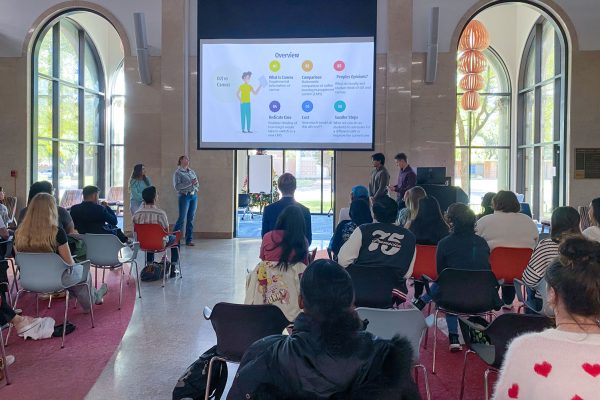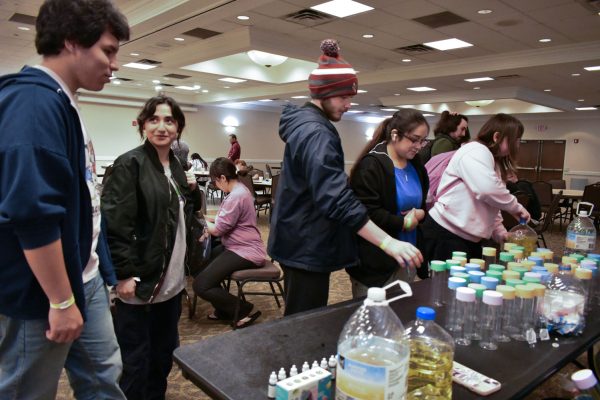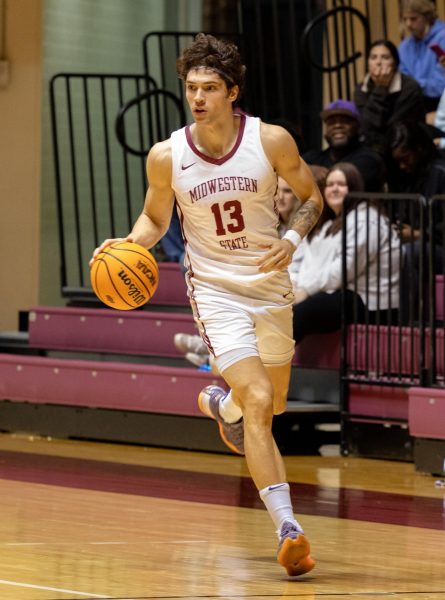Breast Cancer Awareness Month: Spreading awareness at MSU Texas
October is Breast Cancer Awareness Month, and Mustangs are focused on raising awareness about the most common type of cancer around the world, throughout October and beyond.
“I think that it’s really important to bring awareness to the health issues people have to deal with, specifically ones related to female biology,” Rachel Shipley, head of the Mosaic Women’s STAND Council, said. “Even though breast cancer can occur in males, it’s a more prominent issue in women, and so it’s important as with every issue, to face it as a unit, together in community, because then it becomes a lot easier to tackle.”
The Sigma Lambda Alpha sorority set the tone for Breast Cancer Awareness Month with a taco sale, ‘Let’s Taco ‘bout Breast Cancer’ in the Clark Student Center on Sept. 29. The chapter shared information on causes, treatments and prevention of the disease while selling fajitas to raise funds for their organization and aid the campus community in understanding the importance of education and early detection of breast cancer throughout the month.
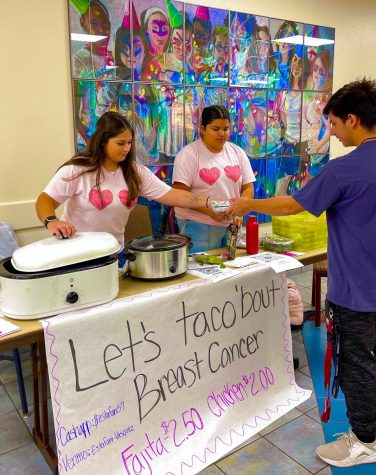
“We want to bring awareness to breast cancer and put that into [students’] minds heading into the month of October,” Veronica Flores, english senior and SGA senator for the Sigma Lambda Alpha sorority, said. “Breast cancer can affect so many people and not enough of us know the signs until it’s too late.”
Those who have had close encounters with breast cancer understand the importance of education and early detection. Jeanette Perry, mass communication post-baccalaureate student, shared the story of her grandmother who suffered multiple encounters with the disease.
“My grandmother had breast cancer three times before it finally took her life. It was really incredibly difficult for her, because she had to wear a prosthetic since she didn’t have reconstructive surgery. She was uncomfortable in her clothes because she felt she didn’t look right,” Perry said. “It’s not only [about] losing the breast [or breasts]. Dealing with the chemo and being sick while facing your own mortality takes a toll on [your] mental health. You have to be an incredibly strong person to deal with that.”
The effects of breast cancer are far reaching. In addition to physical health declines, women can experience severe mental health and self confidence issues as a result of conventional beauty standards. The Women’s STAND Council under the MOSAIC Cross Cultural Center is making an active effort to combat self image issues this month through their Body Neutrality Paint and Sip on Oct. 20th.
“A big part of what’s associated with breast cancer is having to [undergo] physically altering surgeries to prevent death. There are aesthetic and beauty standards that go along with that,” Shipley said. “We want to take away the toxic positivity that can be associated with the body positivity movement, and to promote falling in love with your body and seeing it as a vessel for potential. I think that’s an idea that’s really congruent with breast cancer — stepping away from aesthetics and taking on life saving surgery and still being able to look at your body as a vessel of life and connection rather than [one of] stigmatized beauty.”
Education is an important part of prevention, but there are numerous gaps in knowledge and misunderstandings where breast cancer is concerned. Dr. Keith Williamson, director of the Vinson Health and Wellness Center, thus emphasizes the importance of education and research on the topics.
“There’s tons of readily available information out there. But how do you know what to trust when in the age of the internet, everything floats the same, [whether its] junk or fact? While the internet has also made it fashionable not to trust authority figures, authoritative organizations are still an excellent source of information for this. The American Cancer Society, the American College of OB/GYN, the American Academy of Family Physicians and your personal physician [are reliable information on Breast Cancer],” Williamson said.
Williamson also recommends their ‘Well Woman’ exams available to students where he teaches crucial and foundational education on women’s health in small groups. He states that these services are pertinent to the issue of breast cancer, as they provide information on breast cancer surveillance.
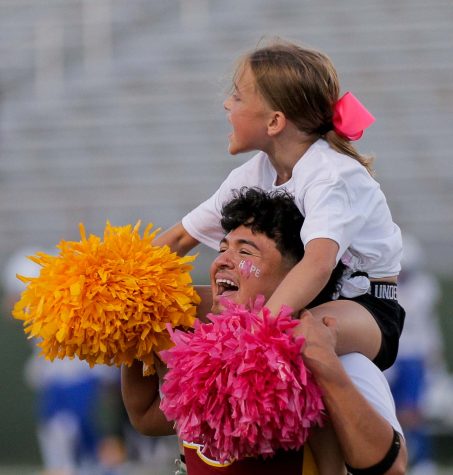
“Here’s a fun factoid: the only thing that’s been proven effective at screening for breast cancer is mammograms. There is a common misconception that a self-breast exam is scientifically validated to detect breast cancer earlier, [but] they cannot be demonstrated scientifically to be effective in large groups. Clinical breast exams and self breast examinations are still widely practiced and taught methods of breast cancer detection, so I still recommend [them] once a month, the week after [your] period, because like any doctor, I’ve [seen it] save the lives of my patients,” Williamson said.
Williamson explained that while not scientifically validated, self-examinations are still a potentially life-saving skill important to learn and practice. This is crucial for young women since there is a risk benefit ratio associated with mammograms in women under 30.
“When you screen a woman too young, not only are you conducting unnecessary procedures half the time, you are screening breasts that are physiologically more dense, which makes cancers harder to detect. There are risks associated with screening young women for breast cancer such as radiation, excess monetary and timely costs and [test] anxiety, but there is also the benefit of detecting the cancer early enough to treat it effectively,” Williamson said.
Since age is the highest risk factor for breast cancer in women, Williams stressed the importance of beginning screenings by age 40-50. Mammograms get more effective with age, so he urges women to get screened if not yearly, then every other year.
“Early detection is key. And I know that mammograms aren’t comfortable — I’ve had them — but they are necessary because if you catch it early enough, it’s treatable and it doesn’t have to be a life sentence for you,” Perry said.
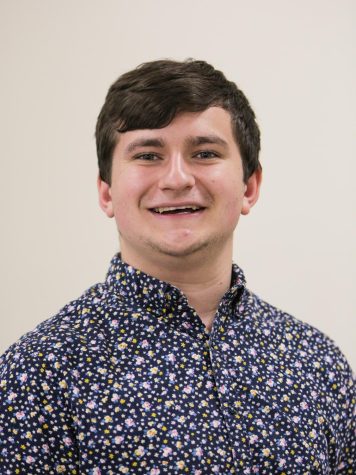
Howdy hey! I'm back for my final year here at MSU, and I intend to leave the Wichitan better than I found it.
Going into my fourth year, I will be working...



